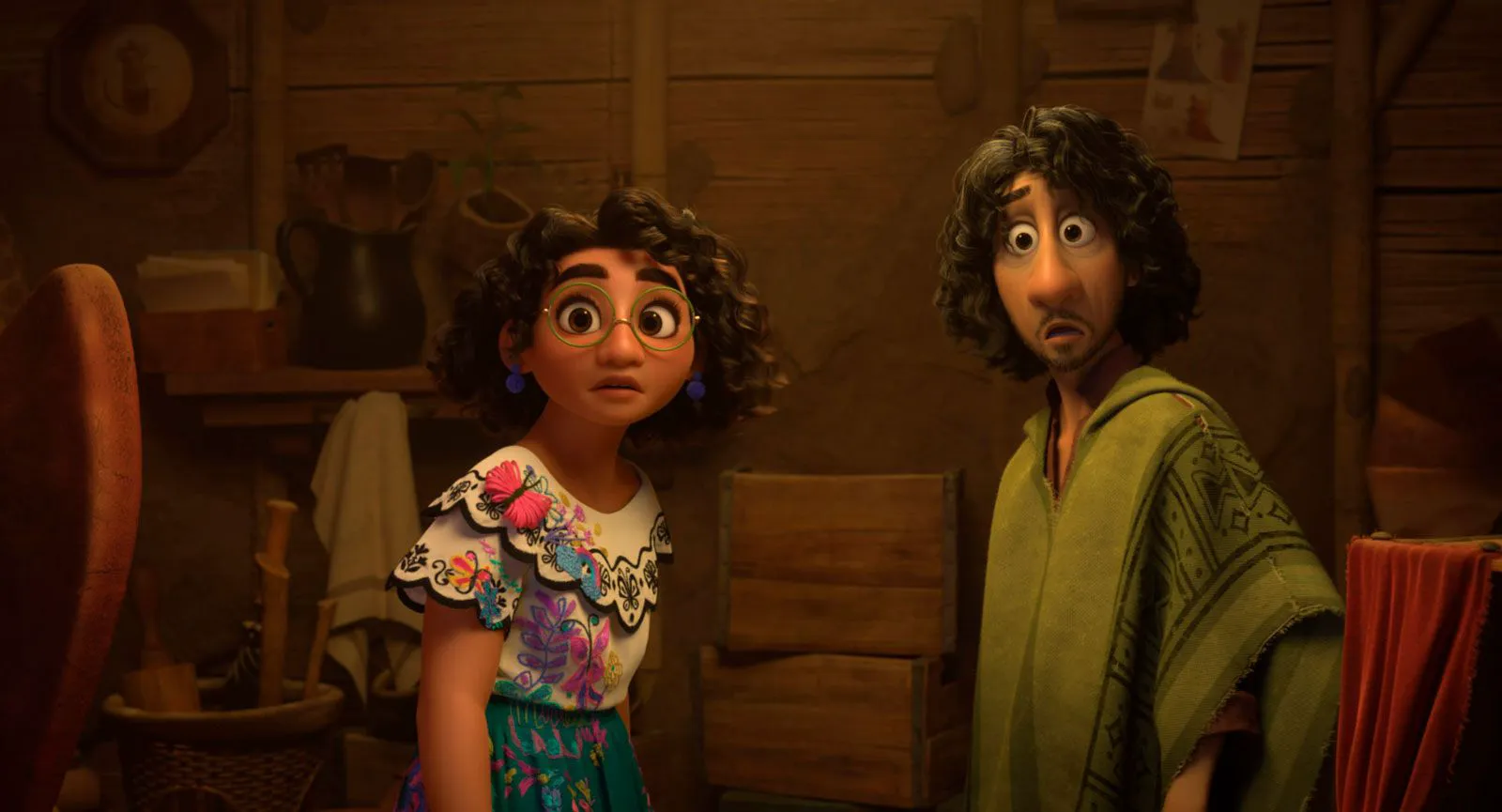Encanto: A Magical Family Affair
In the era of the Colombian revolution, Alma Madrigal and her husband fled their hometown, seeking refuge from soldiers. They were cornered near a river, where her husband sacrificed himself. The woman’s grief materialized into a magical candle, giving rise to towering mountains that isolated Alma and the other refugees from the rest of the world.
Years later, she resides with her children and grandchildren in a vibrant villa named Casita (which can reshape itself on the fly and even communicate through its floorboards). She watches over the small, cozy town of Encanto, hidden from civilization ever since. Upon reaching a certain age, each family member undergoes a ritual: the candle bestows upon them a superpower, and a new room appears in the house. Isabela Madrigal is incredibly strong, Julieta can conjure plants from thin air, and young Felix can converse with animals. Only once did the ceremony fail – granddaughter Mirabel received no gift, leaving her feeling insecure amidst her wondrous relatives. So, when strange cracks begin to appear in Casita, Mirabel takes it upon herself to investigate what is happening to their family’s magic. To do so, she must find her uncle Bruno, a family outcast with the ability to foresee the future (though, sadly, not always a bright one).

Still from the animated film “Encanto”
A Quiet Release from Disney
It’s peculiar to realize that a new animated film from the studio giant Disney is being released without much fanfare, almost unnoticed, overshadowed by louder titles in an already sparse post-pandemic release schedule. Even the box-office disappointment “Raya and the Last Dragon” seemed to generate more public interest. Perhaps audiences are weary of the monolithic style of Disney films, where every character appears to be a modification of the last, or perhaps the studio’s new ideological direction isn’t resonating. Since “Moana,” Disney has been attempting to reformat the myths of various countries into comfortable family entertainment.
A Colombian Tale Inspired by Márquez
This time, the producers’ gaze fell upon Colombia, with “Encanto” drawing inspiration not from national legends, but (surprisingly) from Gabriel Garcia Marquez’s novel “One Hundred Years of Solitude.” It shares the same story of a community fleeing revolution, the same saga of a large family haunted by a conditional “curse.” Add in songs, colorful magic, and a plot reminiscent of “The Incredibles” – about an ordinary person without powers overshadowed by their extraordinary family. Minus the violent scenes of executions and incest, of course.

Still from the animated film “Encanto”
An Intimate Family Drama
In “Encanto,” the action rarely ventures beyond the confines of the house. Even the search for Bruno – which one would expect to lead into the dreaded outside world – takes place entirely within its walls. Casita becomes a universe for the Madrigals, and the family conflict is concentrated within a closed, preserved system with no escape. Even when a path out of the mountain-enclosed village is opened (for reasons we won’t spoil), no one seems particularly interested. The characters linger at the boundary, as if to suggest that solving internal problems requires neither adventure nor great discoveries – just open communication.
This is a curious approach – a chamber drama is the last thing one would expect from a Disney film. Unless, of course, one considers “chamber” a space where an entire forest or a towering, terrifying tower with a spiral staircase to the sky can magically fit within the confines of a room. But this very confinement is what hinders the film the most. “Encanto” lacks a compelling external conflict to reflect the climate within the family, resulting in a lack of truly engaging events. Everything happens somewhat organically: every problem is solved through the power of love, and even irreconcilable sisters instantly reconcile – all it takes is a song.

Still from the animated film “Encanto”
A Return to Musical Tradition
After films like “Tangled” or even “Moana,” where characters joked about the urge to sing at every dramatically important moment, it’s strange to see a film with such a traditional and outdated form of Disney musical. In “Encanto,” songs are almost the only way to advance the plot, and only in musical numbers do hints of creative animation and interesting visual solutions emerge. It’s difficult to fault the creators for trusting Lin-Manuel Miranda’s melodies (who better to trust?), but their devotion to the classic structure is tiring.
In a way, “Encanto” perfectly reflects its time – it’s an endlessly comfortable, almost conflict-free film where there are no bad people, and song therapy works better than any weapon. It’s the ideal film for an era where the only correct position is to be in favor of all things good, and any problems are solved on a psychologist’s couch. Finally, it’s a grand manifesto of “ordinariness”: superpowers only lead to internal trauma, great responsibility and great power are unnecessary, and the ordinary person who simply knows how to listen always triumphs.